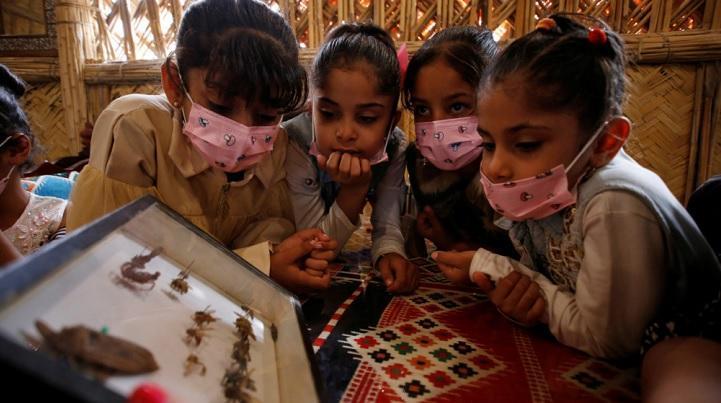
COVID-19 represents a true child rights crisis, and not only has the pandemic directly affected children’s health, but it has also disrupted their education and access to vital vaccines, nutrition, protection and mental health services, a UNICEF official has said.
Regina De Dominicis, UNICEF’s new representative to Turkey, pointed at the fact that children are at heightened risk of exploitation, violence and abuse when schools are closed, jobs are lost, and movement is restricted during health emergencies. On the occasion of World Children’s Day on Nov. 20, the U.N. official urged reimagining ways to work together to increase the equality of opportunities for every child.
In an interview with Hürriyet Daily News, she underlined that this extremely challenging situation for everybody, including for parents and caregivers, increases stress, and being very keen observers of people and environments, children will notice, absorb and react, which unavoidably will affect their well-being.
“What is important is to try to help children and young people to maintain a sense of normality in their routine. Routine is extremely important to face the stress,” she said underling that maintaining physical and creative activities despite any lockdown is essential to give a sense of normality. Positive parenting plays a crucial role.
In coping with the negative mental consequences of the pandemic, she emphasized that people need to realize that they are not alone in facing current challenges and they should talk to someone about how they feel and express their anxiety and fears openly.
She underlined that children might find it difficult to understand what they are seeing online or on TV – or hearing from other people – so they can be particularly vulnerable to feelings of anxiety, stress and sadness. De Dominicis spoke about her experience in the beginning of the outbreak.
“We were having the TV always on. And at one point my daughter came she switched off the TV. She said, ‘Mamma, now I want a happy breakfast.’ That means she was overwhelmed. I followed her advice and we went through the many challenges the humanity was able to overcome until now and the progress and the extraordinary achievements science made through a very simple story telling. It worked.
She advised to avoid social media content that makes you feel panicked or anxious and urged to craft positivity around us and around children, such as asking them positive-oriented questions.
“I think what is important is to make them understand that there will be an end to this situation, that researchers are working on that direction. That there has been other pandemics in history and humanity has always been able to overcome [them]. I think we need to just open a very supportive discussion with the kids to help them understand but also to make understand that we don’t have all the answers.”
“Perhaps at the end of the day, ask what the best moment of the day was. ‘What made you feel good today? What was the thing that made you most happy/brave/satisfied?’ Finish the day with this positive parenting message and something that can calm the kid down.”
The parents should not avoid informing the kids about the outbreak, and having an open, supportive discussion with children can help them understand, cope and even make a positive contribution to others, she said.
The official noted that parents should talk about hygiene, how to distance from other kids, but at the same time inventing new games that can be done through distance keeping. “Kids are much more resilient than us, we should not forget that. But they do not like, and they get anxious when we hide information. Let’s teach them how from a crisis we can create opportunities for new ways of doing things.
She also drew attention that the slowdown in economies due to the impact of the pandemic increases poverty levels of families and their kids.
“Like in all shocks and crises, children are most likely to be the most affected. Child poverty is likely to be higher than the average poverty. Its multidimensional aspect must be understood and acted upon, starting with a re-focused investment in social protection systems,” the U.N. official has said. De Dominicis also noted that emerging data suggest an overall increase in domestic violence globally since the outbreak of COVID-19.
UNICEF globally has taken a clear position that prolonged school closure has more disadvantages than advantages, not only to avoid learning loss, but also to allow for continuity of other services like immunization, school feeding and mental health in many cases, she said.
Safety measures in schools for children, teachers, school personnel are precondition for safe re-openings, the official added.
“Noting that blended learning approaches are proving to be effective and we are all working on finding solutions which allow balancing the health, learning and economic imperatives,” De Dominicis stated.
The impact on most marginalized children is even bigger. If they are out of school, there are other threats that come in. It could be child labor, domestic violence or early marriages, she said. “For the most vulnerable, the school is the best place to be.”
When it comes to early child education, this is a critical age when the kids learn how to socialize, where their brain is much more active in absorbing, where “early stimulation” with others is essential for emotional safety and social connection, she said, noting that it remains the investment with the highest return when it comes to the strengthening of the human capital of a country.
.